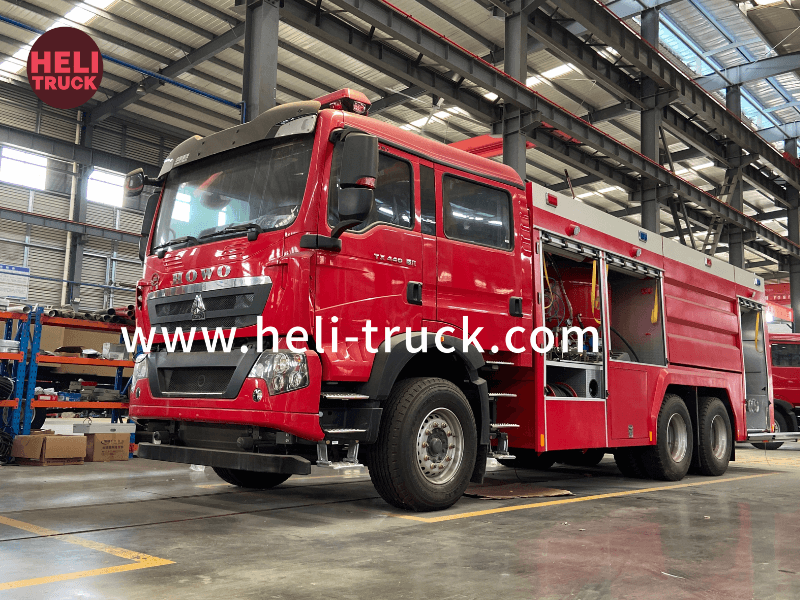Introduction:

Waste management is a critical aspect of urban infrastructure that directly impacts public health, environmental quality, and overall well-being. Garbage compactor trucks play a vital role in the efficient collection and disposal of solid waste in urban and rural areas. These specialized vehicles are designed to compact and transport large volumes of waste material, reducing the number of trips needed for collection and improving overall operational efficiency. In this article, we will explore the significance of garbage compactor trucks in waste management, their types, working mechanisms, benefits, and future prospects.
Overview of Garbage Compactor Trucks:
Garbage compactor trucks, also known as waste compactors or trash compactors, are specialized vehicles equipped with a hydraulic compactor mechanism that compresses and consolidates solid waste materials. These trucks are commonly used by municipal authorities, waste management companies, and sanitation departments for collecting and transporting waste from residential, commercial, and industrial areas to disposal sites such as landfills or recycling facilities.
Types of Garbage Compactor Trucks:
There are several types of garbage compactor trucks designed to cater to different waste management needs. The most common types include:
1. Rear Loader Compactor Trucks: Rear loader compactor trucks are equipped with a compactor mechanism at the rear of the vehicle. Waste collectors manually load the waste into the truck, which is then compacted using hydraulic pressure. These trucks are commonly used for residential waste collection.
2. Front Loader Compactor Trucks: Front loader compactor trucks feature a compactor mechanism at the front of the vehicle. These trucks are ideal for commercial and industrial waste collection, as they can easily pick up large waste containers and empty them into the compactor.
3. Side Loader Compactor Trucks: Side loader compactor trucks have a compactor mechanism on the side of the vehicle. Waste collection is done by lifting and emptying waste containers into the compactor. These trucks are suitable for areas with narrow streets or limited access.
4. Stationary Compactors: Stationary compactors are fixed installations that compress waste at the site of generation, such as commercial or industrial facilities. These compactors are used to reduce the volume of waste before transportation to disposal sites.
Working Mechanism of Garbage Compactor Trucks:
Garbage compactor trucks operate on a simple yet efficient mechanism that involves several key components:
1. Compactor Mechanism: The heart of a garbage compactor truck is the compactor mechanism, which consists of a large hydraulic ram that compresses the waste material inside the truck's storage compartment. The compactor is controlled by hydraulic systems that apply pressure to compact the waste effectively.
2. Loading System: Depending on the type of compactor truck, the loading system may vary. Rear loader trucks require manual loading of waste by waste collectors, while front loader and side loader trucks use mechanical arms or lifting mechanisms to pick up waste containers and empty them into the compactor.
3. Garbage Compactor Truck smart features : Garbage compactor trucks are equipped with a storage compartment where the waste material is collected and compacted. The size of the storage compartment varies depending on the truck's capacity and intended use.
4. Hydraulic Systems: Hydraulic systems power the compactor mechanism and other moving parts of the garbage compactor truck. These systems control the compression force, loading mechanisms, and other functions of the truck.
Benefits of Garbage Compactor Trucks:
Garbage compactor trucks offer numerous benefits for efficient waste management practices:
1. Increased Efficiency: By compacting waste material, garbage compactor trucks can transport larger volumes of waste in fewer trips, reducing fuel consumption and operational costs.
2. Improved Hygiene: Compacted waste reduces the risk of spillage, odors, and vermin infestation during transportation, maintaining a cleaner and more hygienic environment.
3. Space Saving: Compacted waste takes up less space in the storage compartment, allowing for more waste collection before the truck needs to be emptied.
4. Environmental Impact: Garbage compactor trucks help reduce the carbon footprint of waste collection operations by optimizing transportation efficiency and reducing emissions.
5. Worker Safety: The use of compactor trucks minimizes manual handling of waste by workers, reducing the risk of injuries and occupational hazards.
Future Prospects of Garbage Compactor Trucks:
As urban populations continue to grow, the demand for efficient waste management solutions is expected to increase. Garbage compactor trucks are likely to play a crucial role in meeting this demand by improving waste collection efficiency, reducing environmental impact, and enhancing public health and hygiene standards. Future developments in garbage compactor truck technology may include:
1. Integration of IoT and Telematics: IoT (Internet of Things) technology can be integrated into garbage compactor trucks to enable real-time monitoring of waste collection routes, compaction levels, and maintenance requirements. Telematics systems can provide valuable data for optimizing operational efficiency and reducing downtime.
2. Alternative Fuel Options: As the focus on sustainability and environmental conservation grows, garbage compactor trucks may transition to alternative fuel options such as electric, hybrid, or biofuel-powered engines. These options can help reduce greenhouse gas emissions and dependence on fossil fuels.
3. Automated Collection Systems: Automation technologies such as robotic arms, sensors, and AI-driven systems may be incorporated into garbage compactor trucks to automate waste collection processes. This can improve operational efficiency, reduce labor costs, and enhance safety standards.
Conclusion:
Garbage compactor trucks are indispensable assets in modern waste management systems, offering a range of benefits in terms of efficiency, hygiene, space utilization, and environmental impact. As urbanization and waste generation continue to rise, the role of garbage compactor trucks in ensuring effective waste collection and disposal will become increasingly important. By embracing technological advancements and sustainable practices, the future of garbage compactor trucks looks promising in contributing to cleaner, healthier, and more sustainable communities.
